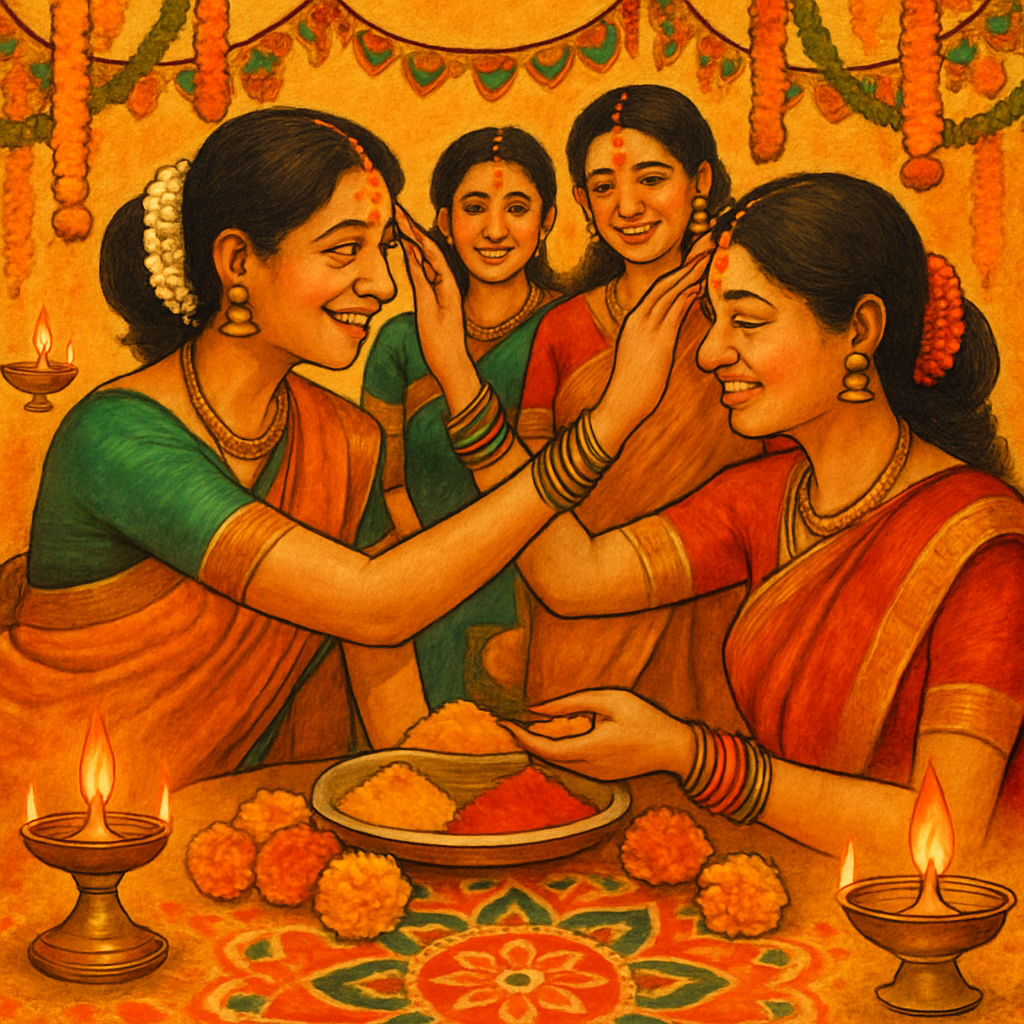
Haldi Kumkum Rituals and Celebration: The Ultimate Guide to Tradition, Significance, and Modern Festivities
The Haldi Kumkum rituals and celebration are one of the most cherished and vibrant cultural customs in India, especially among married women. This colorful festival signifies respect, love, and the strong familial bonds among women, bringing together families and communities in a spirit of joy, blessings, and togetherness. Beyond the ritualistic application of turmeric (haldi) and vermilion powder (kumkum), the celebration honors womanhood, prosperity, and social harmony.
This comprehensive article explores every aspect of Haldi Kumkum, from its historical origins, traditional significance, detailed ritualistic practices, regional variations, gift-giving customs, to modern adaptations and eco-friendly approaches, enabling you to fully appreciate and celebrate this heartwarming festival.
Table of Contents
- Historical Origins and Cultural Significance
- Understanding the Symbolism of Haldi and Kumkum
- Detailed Haldi Kumkum Rituals and Customs
- Regional Variations and Unique Practices
- Meaningful Gift Ideas for Haldi Kumkum Celebration
- How to Host a Memorable Haldi Kumkum Celebration
- Health Benefits of Haldi Used in Rituals
- Modern and Eco-Friendly Haldi Kumkum Celebrations
- Frequently Asked Questions (FAQs)
- Conclusion
Historical Origins and Cultural Significance
The Ancient Roots of Haldi Kumkum
The Haldi Kumkum rituals and celebration have deep roots tracing back thousands of years within Hindu traditions. Historically, the festival was closely associated with the worship of Goddess Shakti—the symbol of feminine power, fertility, and strength. Turmeric (haldi) and vermilion powder (kumkum) were considered sacred substances used during auspicious ceremonies for protection and blessings.
In its earliest form, the ritual functioned as a prayer by married women for the longevity, health, and prosperity of their husbands. Over time, it evolved into a broader social festival commemorating the spirit of womanhood and communal harmony. The ritual’s progression from a strictly religious ceremony to a widely embraced cultural celebration shows its enduring relevance in Indian society.
The Festival’s Timelessness and Community Bonding
What makes the Haldi Kumkum celebration especially precious is its emphasis on nurturing relationships, fostering mutual respect, and reinforcing social bonds among women. The participation cuts across age groups and generations, making it an occasion where traditions and values are passed down gracefully. Celebrated during popular festivals such as Sankranti and Navratri, it continues to be an essential thread in India’s cultural fabric.
For more insight into Indian festivals and their origins, you can visit Britannica’s guide to Indian festivals.
Understanding the Symbolism of Haldi and Kumkum
The Sacred Meaning of Haldi (Turmeric)
Haldi, commonly known as turmeric, holds a revered place in Indian culture. It is much more than a spice—turmeric is seen as a symbol of purity, healing, and auspicious beginnings. Its antiseptic properties made it invaluable in ancient times for protection against infections. Spiritually, haldi is believed to cleanse the body and aura, warding off negativity and bringing good luck.
The Auspicious Representation of Kumkum (Vermilion)
Kumkum, the bright red powder traditionally made from turmeric and lime, signifies marital bliss, prosperity, and fertility. Its red hue symbolizes energy, love, and the divine feminine power. In many traditions, married women apply kumkum (or sindoor) as a mark of their marital status, making it a crucial element in Haldi Kumkum ceremonies.
Together, the application of haldi and kumkum during the ritual represents a fusion of purification, protection, prosperity, and celebration of feminine strength.
Detailed Haldi Kumkum Rituals and Customs
When Is Haldi Kumkum Celebrated?
This festival coincides with several auspicious occasions across India, including:
- Makar Sankranti: Celebrated in January, marking the harvest season.
- Navratri: The nine-night festival honoring Goddess Durga.
- Regional New Year Celebrations: Such as Gudipadwa in Maharashtra and Ugadi in Karnataka.
These occasions provide the perfect backdrop to celebrate Haldi Kumkum rituals with family and friends.
Step-by-Step Haldi Kumkum Ritual
- Welcoming and Purification:
The hostess welcomes the gathering by applying haldi on the foreheads of guests, symbolizing purity and well-being. This step is full of blessings and good wishes. - Application of Kumkum:
The kumkum is applied right after haldi, often on the forehead or the hair parting, marking auspiciousness and the sacred bond of marriage. - Gift Exchange:
Women exchange gifts such as kumkum boxes, bangles, sweets, and brass diyas to signify affection and strengthen social ties. - Prayer and Devotional Singing:
Ritual prayers are offered for family prosperity, particularly the health and long lives of husbands. Devotional songs and bhajans enhance the spiritual atmosphere. - Socializing and Festive Treats:
The celebration culminates with sharing homemade sweets and enjoying merry conversations, building joyful memories.
Essential Items Used in the Ritual
- Fresh Marigold Flowers: Used in decorations and garlands.
- Brass Diyas and Lamps: Symbolizing light and victory over darkness.
- Sweets: Laddoo, barfi, and other regional delicacies.
- Haldi and Kumkum Powders: Natural and vibrant.
Regional Variations and Unique Practices
Maharashtra: Gudipadwa and Haldi Kumkum
In Maharashtra, Haldi Kumkum is an essential part of Gudipadwa, the Marathi New Year celebration. Besides the standard rituals, families host large gatherings, cultural programs, and traditional meals. Women traditionally wear sarees, creating an atmosphere of vibrant elegance.
Karnataka: Ugadi Festival
In Karnataka, the festival coincides with Ugadi, marked by floral decorations, prayer ceremonies, and elaborate feasts. The exchange of gifts often features handmade crafts and sweets symbolizing well-wishes.
Tamil Nadu and Other Southern States
The festival coincides with different regional observances, blending local customs with traditional Haldi Kumkum rituals. Classical music and dance often complement the celebrations.
For more regional cultural insights, explore Cultural India’s festival guide.
Meaningful Gift Ideas for Haldi Kumkum Celebration
Gift-giving plays a vital role in reinforcing relationships and festive spirits. Thoughtful gift ideas include:
- Ornate kumkum containers made from brass or decorated wood.
- Traditional bangles and ethnic jewelry reflecting local craftsmanship.
- Decorative brass diyas and oil lamps for home rituals.
- Handmade natural skincare products using turmeric and sandalwood.
- Assorted sweet boxes featuring homemade traditional delicacies.
- Personalized eco-friendly gift baskets.
How to Host a Memorable Haldi Kumkum Celebration
Decoration Ideas
- Use vibrant marigold garlands for doorways and altars.
- Create colorful rangoli patterns at the entrance.
- Light up spaces with brass and earthen diyas.
- Arrange seating to encourage social interactions.
Activities to Include
- Organize devotional singing or bhajan sessions.
- Host folk dance performances to celebrate heritage.
- Include kids in rangoli-making or cultural art workshops.
- Plan a traditional meal highlighting regional Indian cuisine.
Eco-Friendly Practices
- Use natural haldi and kumkum powders prepared at home.
- Avoid plastic decorations and opt for biodegradable materials.
- Serve food in eco-friendly plates and utensils.
Health Benefits of Haldi Used in Rituals
Haldi is not only spiritually significant but medically beneficial. It contains curcumin, a potent antioxidant with anti-inflammatory, antibacterial, and antiviral properties. Regular application during rituals is believed to boost skin health, purify the body, and provide immunity support. This blend of cultural and health benefits adds a unique charm to the Haldi Kumkum tradition.
Modern and Eco-Friendly Haldi Kumkum Celebrations
The festival has adapted beautifully to modern times. Many families adopt:
- Eco-conscious rituals by using organic natural powders and biodegradable decor.
- Digital celebrations via video calls that include distant family members.
- Themed parties where traditional customs blend with contemporary fun.
- Workshops educating participants on the ritual’s history and significance.
Frequently Asked Questions (FAQs)
Q: Can unmarried women participate in Haldi Kumkum?
A: While traditionally reserved for married women, many communities now encourage inclusive participation.
Q: When is the best time to celebrate Haldi Kumkum?
A: During Sankranti, Navratri, regional new year festivities, or any auspicious date chosen by the family.
Q: How can I make natural haldi and kumkum powders?
A: Use turmeric mixed with rice flour for haldi, and dried beetroot powder with turmeric for kumkum.
Q: What gifts are appropriate for Haldi Kumkum?
A: Kumkum containers, bangles, sweets, decorative diyas, organic skincare items.
Q: How has technology influenced Haldi Kumkum celebrations?
A: Virtual ceremonies allow families separated by distance to participate and share blessings.
- Learn more about Indian Festivals and Their Importance
- Discover traditional Gift Ideas for Indian Festivals
Conclusion
The Haldi Kumkum rituals and celebration showcase the beauty of India’s cultural diversity, spirituality, and social harmony. This festival, through its blend of ancient customs and modern adaptations, continues to be a meaningful celebration of womanhood, family bonds, and community spirit. By embracing sustainable and inclusive practices, the tradition remains vibrant and relevant, passing its legacy with love and pride to future generations.
Haldi Kumkum rituals and celebration | Haldi Kumkum rituals and celebration | Haldi Kumkum rituals and celebration | Haldi Kumkum rituals and celebration | Haldi Kumkum rituals and celebration | Haldi Kumkum rituals and celebration | Haldi Kumkum rituals and celebration | Haldi Kumkum rituals and celebration | Haldi Kumkum rituals and celebration | Haldi Kumkum rituals and celebration | Haldi Kumkum rituals and celebration | Haldi Kumkum rituals and celebration |
